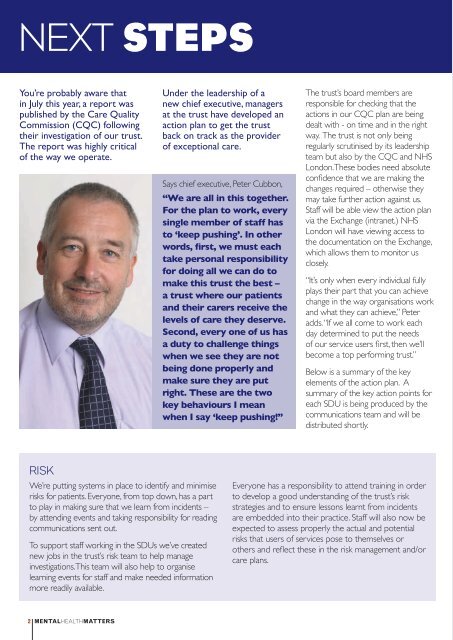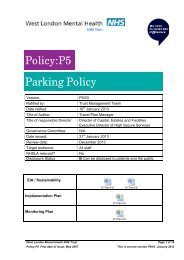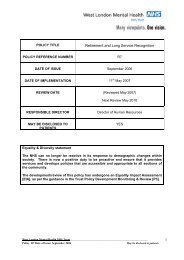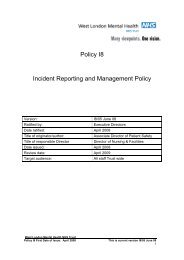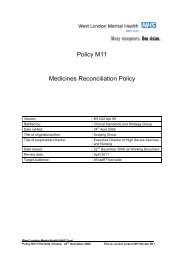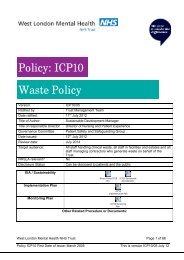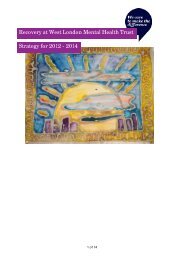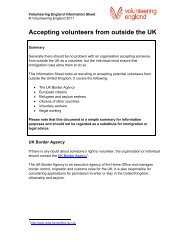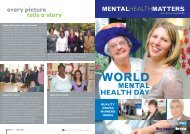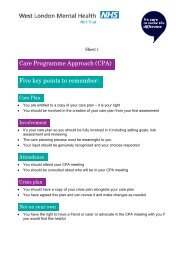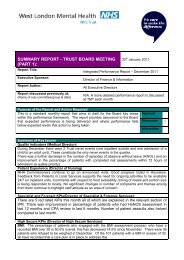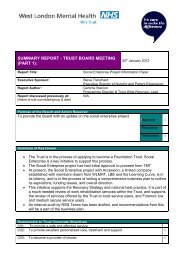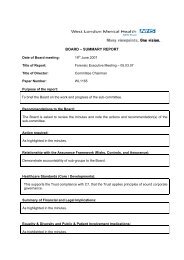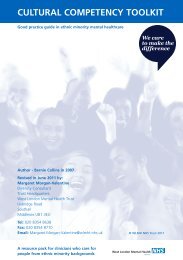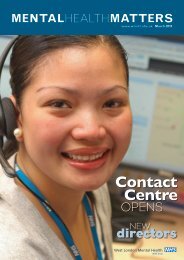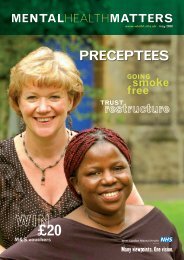MENTALHEALTHMATTERS - West London Mental Health NHS Trust
MENTALHEALTHMATTERS - West London Mental Health NHS Trust
MENTALHEALTHMATTERS - West London Mental Health NHS Trust
Create successful ePaper yourself
Turn your PDF publications into a flip-book with our unique Google optimized e-Paper software.
Next steps<br />
You’re probably aware that<br />
in July this year, a report was<br />
published by the Care Quality<br />
Commission (CQC) following<br />
their investigation of our trust.<br />
The report was highly critical<br />
of the way we operate.<br />
RISK<br />
We’re putting systems in place to identify and minimise<br />
risks for patients. Everyone, from top down, has a part<br />
to play in making sure that we learn from incidents –<br />
by attending events and taking responsibility for reading<br />
communications sent out.<br />
To support staff working in the SDUs we’ve created<br />
new jobs in the trust’s risk team to help manage<br />
investigations. This team will also help to organise<br />
learning events for staff and make needed information<br />
more readily available.<br />
Under the leadership of a<br />
new chief executive, managers<br />
at the trust have developed an<br />
action plan to get the trust<br />
back on track as the provider<br />
of exceptional care.<br />
Says chief executive, Peter Cubbon,<br />
“We are all in this together.<br />
For the plan to work, every<br />
single member of staff has<br />
to ‘keep pushing’. In other<br />
words, first, we must each<br />
take personal responsibility<br />
for doing all we can do to<br />
make this trust the best –<br />
a trust where our patients<br />
and their carers receive the<br />
levels of care they deserve.<br />
Second, every one of us has<br />
a duty to challenge things<br />
when we see they are not<br />
being done properly and<br />
make sure they are put<br />
right. These are the two<br />
key behaviours I mean<br />
when I say ‘keep pushing!”<br />
The trust’s board members are<br />
responsible for checking that the<br />
actions in our CQC plan are being<br />
dealt with - on time and in the right<br />
way. The trust is not only being<br />
regularly scrutinised by its leadership<br />
team but also by the CQC and <strong>NHS</strong><br />
<strong>London</strong>. These bodies need absolute<br />
confidence that we are making the<br />
changes required – otherwise they<br />
may take further action against us.<br />
Staff will be able view the action plan<br />
via the Exchange (intranet.) <strong>NHS</strong><br />
<strong>London</strong> will have viewing access to<br />
the documentation on the Exchange,<br />
which allows them to monitor us<br />
closely.<br />
“It’s only when every individual fully<br />
plays their part that you can achieve<br />
change in the way organisations work<br />
and what they can achieve,” Peter<br />
adds. “If we all come to work each<br />
day determined to put the needs<br />
of our service users first, then we’ll<br />
become a top performing trust.”<br />
Below is a summary of the key<br />
elements of the action plan. A<br />
summary of the key action points for<br />
each SDU is being produced by the<br />
communications team and will be<br />
distributed shortly.<br />
Everyone has a responsibility to attend training in order<br />
to develop a good understanding of the trust’s risk<br />
strategies and to ensure lessons learnt from incidents<br />
are embedded into their practice. Staff will also now be<br />
expected to assess properly the actual and potential<br />
risks that users of services pose to themselves or<br />
others and reflect these in the risk management and/or<br />
care plans.<br />
REDEVELOPMENT OF BROADMOOR<br />
HOSPITAL AND EALING SITE<br />
The leadership team has prioritised redevelopment plans<br />
for Broadmoor Hospital and the trust’s Ealing site and<br />
these will be advanced with the full support of the board.<br />
BED MANAGEMENT<br />
Our commissioners are strengthening their role so that<br />
together we can properly ensure that there are the right<br />
number of beds for each patient group and a sufficient<br />
range of alternatives to hospital admission. All staff working<br />
in clinical areas have a job to do in making sure that our<br />
patients get the type of care they need when they are in<br />
our services.<br />
STAFFING LEVELS<br />
We are re-looking at our HR processes to make it easier<br />
for us to recruit staff in a timely fashion. We’ve set targets<br />
to reduce staff vacancies - and these targets will be strictly<br />
monitored. We‘ll review recruitment campaigns and<br />
focus on recruiting more quickly to fill staffing gaps. We’ll<br />
be monitoring staff sickness more rigorously to identify<br />
problem areas and using HR processes to sort them out.<br />
The trust board has given its full support to initiatives<br />
such as mandatory training, professional development,<br />
leadership development, pre and post registration training,<br />
supervision and performance development review. The<br />
overall aim of this is to develop the trust into an employer<br />
that attracts high calibre staff who choose to stay with<br />
us and have meaningful careers here. For example, the<br />
trust will develop rotation schemes for qualified nursing<br />
staff and improve internal transfer processes, as well as<br />
continuing to be more proactive in employing people with<br />
mental health issues.<br />
MANDATORY TRAINING OF STAFF<br />
Extra mandatory training sessions are being made<br />
available, and more locally to staff in some areas. We’re<br />
putting in a new electronic system to help staff understand<br />
what mandatory training they need to attend and to<br />
book themselves onto courses. We’ll monitor and report<br />
on attendance so that staff and their managers are clear<br />
about what is expected of them. As a starting point we’re<br />
reviewing the mandatory training requirements for staff<br />
and once these are agreed we’ll be letting everyone know.<br />
PHYSICAL HEALTHCARE OF PATIENTS<br />
We’ll be giving the physical healthcare needs of people<br />
who use the trust’s services a higher priority, particularly<br />
in forensic services where the CQC report flagged it as<br />
a more significant problem. All SDUs will have a physical<br />
activity programme in place which will include for example<br />
a walking group. Staff have a role to play in ensuring our<br />
patients have equity of access to primary care services.<br />
MEDICINES MANAGEMENT<br />
We will continue to strengthen the role of pharmacy at the<br />
trust so that it’s better embedded into the service delivery<br />
units. We are reviewing resources for pharmaceutical advice<br />
and will strengthen them if necessary, with investment so<br />
that staff and services users receive the right advice and<br />
support when it comes to medication.<br />
CULTURAL CHANGE<br />
The CQC said that the trust must develop its board so<br />
that it can promote a more dynamic, innovative culture<br />
that encourages staff to be enthusiastic, up to date with<br />
current practice and highly motivated. Board members<br />
are participating in management development to help<br />
them raise their game to lead the organisation to new<br />
levels of success. It doesn’t stop there, though. Every<br />
single member of staff has a role to play in supporting<br />
the ongoing change process at the trust so that the<br />
culture of the organisation changes.<br />
TRUST MUST BECOME A LEADER<br />
For the trust to become a leader we know we need to<br />
develop local leaders in all areas of the trust. These local<br />
leaders will challenge things when they are not going well<br />
and fix them so that we as a trust we will then be in a<br />
position to start shouting about the good work being done<br />
here, to colleagues and others outside the organisation.<br />
NON - EXECUTIVE DIRECTORS<br />
The trust’s non-executive directors have signed up to<br />
closer working with patients which will help them to have<br />
a better understanding of their experiences of using our<br />
services. This will help them in their role of working with<br />
the directors to improve the experiences of our patients.<br />
MEETINGS<br />
Work has already started to change the way meetings are<br />
run, to streamline them so that effective decision-making<br />
can happen more quickly.<br />
2 <strong>MENTALHEALTHMATTERS</strong><br />
<strong>MENTALHEALTHMATTERS</strong><br />
3


